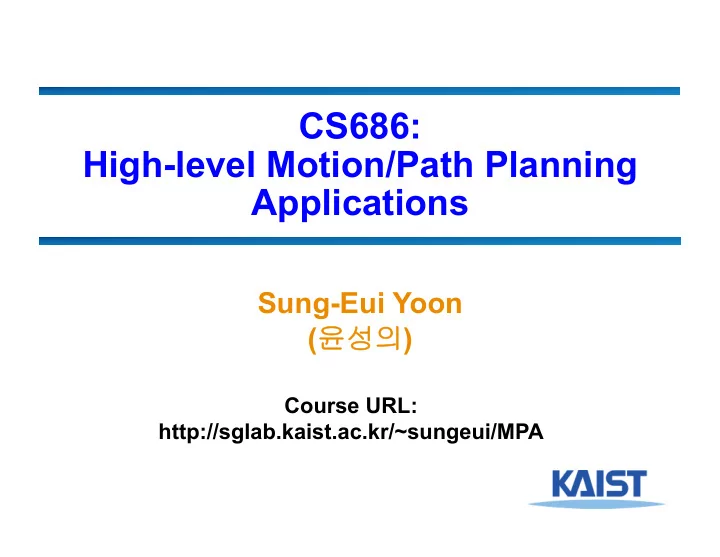

CS686: High-level Motion/Path Planning Applications Sung-Eui Yoon ( 윤성의 ) Course URL: http://sglab.kaist.ac.kr/~sungeui/MPA
Class Objectives ● Discuss my general research view on motion planning ● Discuss related applications ● Study task planning 2
Our Research Directions ● Many robots are available ● Different sensors and controls ● Basic controls are developed with such robots ● Primitive motions are developed together ● Therefore, motion/path planning are widely researched 3
Our Research Directions ● General motion planning tools ● Primitive controls are available at HW vendors ● How can we design a standard MP library working with those different robots? ● For example, OpenGL for the robotics field; vendors support OpenGL, and programmer uses OpenGL for their applications 4
Our Research Directions ● High-level motion strategy are necessary ● Optimal paths given constraints ● Handling multiple robots for certain tasks ● E.g., how can we efficiently assemble and disassemble the Boeing plane? 5
Our Research Directions ● High-level motion strategy are necessary ● Optimal paths given constraints ● Handling multiple robots for certain tasks ● E.g., “Clean them!” 6
Our Research Directions ● High-level motion strategy are necessary ● Optimal paths given constraints ● Handling multiple robots for certain tasks ● E.g., dangerous places for human 7
Task Search and Classification ● Identify and classify a number of initially unknown targets ● Useful for tedious, dangerous, or impossible for humans (underwater, disaster sites, etc.) ● How can effectively perform this process during limited deployment time? Long-horizon Robotic Search and Classification using Sampling-based Motion Planning Hollinger, et al. 8
Task Search and Classification ● Environment (e.g., ocean) monitoring Use robotic sensor networks ● each node can move autonomously or work with others Different marine sensors, Smith et al. Marine sampling 9
Minority Report 10
Planning with Dynamics tribuneindia 11
Physical Systems Planning Kavraki 12
Physical System Planning 13
Planning with Dynamics ● Adding dynamics is essential to increase physical realism ● Techniques from control theory can be used to create better paths ● Still fairly open 14
Case Study: Self-Driving Cars Typical systems of autonomous vehicles: many sensors and ECUs Google images 15
Plan of Development: Response to Plan Evolve ADAS (Advanced Driver Assistance Systems) focusing on fast response to autonomous driving (high- level reasoning) 16
ADAS Sensors ● Need to identify lanes, pedestrians, traffic signs, other nearby cars ● Combine radar for detection and camera for recognition 17
Technical Issues ● High accuracy ● 99.99% is not enough for detection and recognition problems (e.g., detecting red signs) ● Weather challenges Bob Donaldson / Post-Gazette 18
Testing & Certification Testing becomes exponentially more complex as more sensors and actuators are added to the vehicle. Path Planning Decision Making Digital Maps All speeds Parking Lots Many more tests Histogram Filters Particle Filters Data Fusion More data (images & video) More test cases Logic Sensor Failures Kalman Filters False Positives National Advanced Driving Simulator
Automated Planning w/ Motion Planning ● Assemble the chair w/ or even w/o the instruction 20
Task Planning ● Works on a high-level sequence of tasks ● Commonly use motion planners before after Slides are from Kang’s work E.g., Desk cleaning 21
Task and Motion Planning ● Motion planner ● Find a collision-free path from a given start position to a goal position ● Task planner ● Find a discrete sequence of actions to transition from a given start state to a desired goal state 22
Overall Process of Task and Motion Planning PLAN EXECUTE Goal state Initial state Move Pick & Place Motion primitives (Actions) 23
HPN ● Hierarchical task and motion Planning in the Now – [ICRA11] 24 Hierarchical task and motion planning – Lozano Perez’s slide
HPN ● Fluent : A set of symbolic predicates ● In(O,R), ClearX(R, Os), Clean(O), … ● Operator : A set of primitive actions ● Pick, Place, Wash, … 25
Running Process of HPN ● Goal : In(A, storage), Clean(A) Initial state Clean (A) In(A, storage) Clean(A) 26
Running Process of HPN ● Works in a backward search ● Maintain left expansion of plan tree 27
Class Objectives were: ● Discussed my general research view on motion planning ● Discussed related applications ● Studied task planning 28
Next Time.. ● RRT techniques 29
Homework for Every Class ● Submit summaries of 2 ICRA/IROS/RSS/WAFR/TRO/IJRR papers ● Go over the next lecture slides ● Come up with one question on what we have discussed today and submit at the end of the class 30
Recommend
More recommend